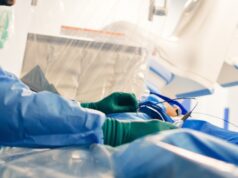The CUPID Phase 2b (Calcium up-regulation by percutaneous administration of gene therapy in cardiac disease) trial is a multinational, multicentre, double-blind, placebo-controlled, randomised study of a single intracoronary administration of 1×10(13) DRP MYDICAR vs. placebo added to an optimal HF regimen. The first patient was dosed in August, 2012 in the United States and, according to the company, the trial will enrol approximately 200 patients in up to 50 international sites.
Jens Kastrup, University Hospital, Copenhagen, Denmark, dosed the first European at The Heart Centre, Rigshospitalet, Denmark. “The development of both ischaemic and non-ischaemic heart failure in patients is an increasing medical problem and there has been no major breakthrough in medication therapy for several years,” said Kastrup. “Therefore, we are constantly looking for new treatment modalities for these patients. The established collaboration with Celladon and the investigation of the new innovative therapy MYDICAR for these patients with serious heart failure is very promising,” he added.
“We are pleased to dose our first patient with MYDICAR outside of the United States and hereby initiating an enduring and imperative collaboration with our European clinical investigators. This is an important step in our development programme which aims to provide a novel, safe, and highly effective therapeutic option to advanced heart failure patients worldwide,” said Krisztina Zsebo, president and CEO of Celladon.
CUPID Phase 2b trial
The CUPID Phase 2b trial was initiated in August 2012 and will enrol approximately 200 patients in up to 50 sites worldwide. Patients will first be prescreened for the presence of AAV neutralising antibodies. Those patients with a negative titer will undergo further screening tests and procedures to determine eligibility prior to randomisation and enrolment into the study. All patients will be randomised in parallel to MYDICAR or placebo in a ratio of 1:1 (1×10 (13) DRP MYDICAR to placebo).
The primary objective of the trial is to determine the efficacy of MYDICAR in patients with ischaemic or dilated cardiomyopathy and NYHA class III/IV symptoms of HF by reducing the frequency and/or delaying HF-related hospitalisations compared to placebo-treated patients.
The primary efficacy endpoint is time-to-recurrent HF-related hospitalisations in the presence of terminal events (all-cause death, heart transplant, LVAD implantation). The secondary efficacy endpoint is the time-to-terminal event (all-cause death, heart transplant, LVAD implantation). Exploratory endpoints include change from baseline in NYHA class, 6 minute walk test distance, and quality of life (KCCQ) score.
Secondary objectives will include assessment of the safety of MYDICAR by determining the incidence and severity of adverse events and changes in laboratory parameters. Safety evaluations include the incidence and severity of all adverse events (including procedure-related), summaries of concomitant medications, vital signs, physical exams, implantable cardioverter defibrillator (ICD) interrogations and laboratory parameters, and the time to cardiovascular-related death.
MYDICAR
MYDICAR is a genetically targeted enzyme replacement therapy intended to restore levels of SERCA2a, a regulator of calcium cycling in the heart and cardiac contractility. SERCA2a levels decline in all forms of late-stage HF resulting in deficient heart function.













